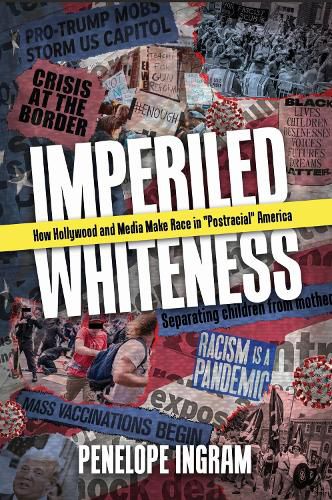Readings Newsletter
Become a Readings Member to make your shopping experience even easier.
Sign in or sign up for free!
You’re not far away from qualifying for FREE standard shipping within Australia
You’ve qualified for FREE standard shipping within Australia
The cart is loading…






This title is printed to order. This book may have been self-published. If so, we cannot guarantee the quality of the content. In the main most books will have gone through the editing process however some may not. We therefore suggest that you be aware of this before ordering this book. If in doubt check either the author or publisher’s details as we are unable to accept any returns unless they are faulty. Please contact us if you have any questions.
In Imperiled Whiteness: How Hollywood and Media Make Race in "Postracial" America, author Penelope Ingram argues that in the Obama-to-Trump era, a variety of media platforms, including film, television, news, and social media, turned white identity into a commodity that was packaged and disseminated to a white populace. The book emphasizes how media in its myriad forms coopted a postracial narrative, making whiteness a disenfranchised commodity and vivifying white nationalist and neo-Nazi movements on the alt-right. While fully recognizing the covert centrality of whiteness to postracial discourses, Ingram challenges existing scholarship to argue that discourses of the postracial era have enabled the rise of an overt white identity politics, a sense of solidarity among white people, including those who espouse liberal or progressive political views.
Ingram explores the convergence of entertainment, news, and social media in a digital networked environment and traces how media's renewed attention to "mainstream whiteness" has propelled a resurgence of rabid white nationalism. Reading popular film and television franchises (The Walking Dead, The Planet of the Apes reboot, and the Star Trek reboot) through the contemporary political flashpoints of immigration reform, gun control, and Black Lives Matter protests, Ingram demonstrates how media buttressed and exploited an affective experience among white audiences-a feeling or sense of vulnerability and loss. Ingram also explores how contemporary Black filmmakers utilize speculative fiction to intercede in and disrupt this shifting racial landscape, through an examination of Jordan Peele's films Get Out and Us, and Ryan Coogler's Black Panther.
$9.00 standard shipping within Australia
FREE standard shipping within Australia for orders over $100.00
Express & International shipping calculated at checkout
Stock availability can be subject to change without notice. We recommend calling the shop or contacting our online team to check availability of low stock items. Please see our Shopping Online page for more details.
This title is printed to order. This book may have been self-published. If so, we cannot guarantee the quality of the content. In the main most books will have gone through the editing process however some may not. We therefore suggest that you be aware of this before ordering this book. If in doubt check either the author or publisher’s details as we are unable to accept any returns unless they are faulty. Please contact us if you have any questions.
In Imperiled Whiteness: How Hollywood and Media Make Race in "Postracial" America, author Penelope Ingram argues that in the Obama-to-Trump era, a variety of media platforms, including film, television, news, and social media, turned white identity into a commodity that was packaged and disseminated to a white populace. The book emphasizes how media in its myriad forms coopted a postracial narrative, making whiteness a disenfranchised commodity and vivifying white nationalist and neo-Nazi movements on the alt-right. While fully recognizing the covert centrality of whiteness to postracial discourses, Ingram challenges existing scholarship to argue that discourses of the postracial era have enabled the rise of an overt white identity politics, a sense of solidarity among white people, including those who espouse liberal or progressive political views.
Ingram explores the convergence of entertainment, news, and social media in a digital networked environment and traces how media's renewed attention to "mainstream whiteness" has propelled a resurgence of rabid white nationalism. Reading popular film and television franchises (The Walking Dead, The Planet of the Apes reboot, and the Star Trek reboot) through the contemporary political flashpoints of immigration reform, gun control, and Black Lives Matter protests, Ingram demonstrates how media buttressed and exploited an affective experience among white audiences-a feeling or sense of vulnerability and loss. Ingram also explores how contemporary Black filmmakers utilize speculative fiction to intercede in and disrupt this shifting racial landscape, through an examination of Jordan Peele's films Get Out and Us, and Ryan Coogler's Black Panther.